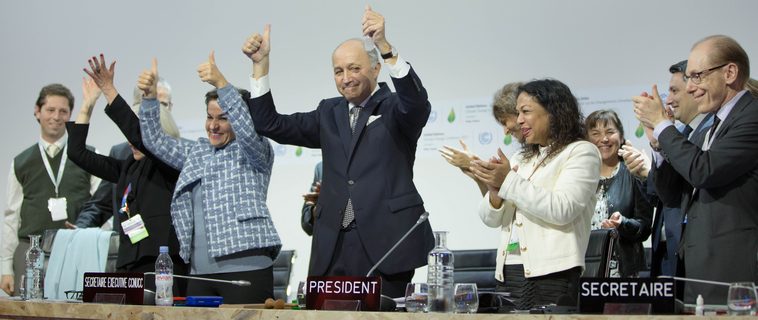The year 2017 is shaping up to be the hottest year on record, resulting in record low sea-ice levels in the Arctic, unprecedented flooding displacing 100,000 and affecting over a million people in Peru, and the threat of mass deaths in parts of Africa as the worst drought in memory deepens famine conditions.

While this is the world at 1°C of warming, much further warming is inevitable: the window to avoid warming above 1.5°C is rapidly closing, and carbon dioxide levels are already at the record-breaking level of 410ppm.
Amid this worsening crisis, countries gather in Bonn, Germany for two weeks from Monday, May 8, 2017 for three simultaneous meetings under the United Nations Framework Convention on Climate Change (UNFCCC).
Since the Paris Summit in December 2015, delegates have met all together only twice-in Bonn last May and Marrakech last November-to figure out how to put the Paris Agreement into practice. Their self-imposed deadline to finish this work is the end of 2018, so the Co-Chairs of the process want countries to move away from conceptual discussion into the nitty gritty of negotiating text at this year’s COP in November. However, some key questions have to be resolved before this can happen.
Who is responsible for taking action?
Although as part of the Paris Agreement all countries will take action to curb their emissions and prepare for climate impacts, they aren’t all expected to undertake exactly the same type or amount of action. Disagreements over this “differentiation” between countries – and their obligations – will spill over into every item on the agenda and which is one of the key underlying divergences within the talks. The answer to how transparency and compliance under the Agreement will be applied differently to countries with varied contexts and capacities has not been agreed and is likely to be a contentious issue throughout the two weeks.
What kinds of actions are countries taking?
Just as fundamental a divergence is the split over what exactly the “contributions” are. Although the Paris Agreement is clear that the contributions are comprehensive, many developed countries would like to effectively renegotiate to see the scope limited to emissions reductions only, so as to not include any mention of financial support or adaptation to climate change. Negotiations over accounting for the contributions, and what information should be provided about them, will therefore see a fierce diplomatic battle between developing and developed countries.
What kind of support is available to help developing countries?
As well as what actions countries will take, a big question remains around what kind of support is on offer. Many developing countries have put forward pledges that are at least partially contingent on financial and technological support, and both the Paris Agreement and Framework Convention oblige rich countries to contribute towards these costs. The estimated need is likely in excess of $4 trillion, yet so far the amount pledged pales in comparison, and the amount of funds actually delivered pales even further. Plugging this gap remains a pressing matter for developing countries.
How will we know if countries are making good on their promises?
The process of tracking and accounting for countries pledged actions will also be the subject to a major debate in Bonn. Developing countries are adamant that the rules around transparency be differentiated to reflect the disparity of capacity between themselves and developed countries. They are similarly adamant that transparency rules should apply not only to emissions reductions pledges, but all the elements of the contributions-including finance, to make sure the donor countries actually deliver new money and don’t succumb to “double counting” existing financial flows.
How do you solve a problem like the U.S.?
In his Presidential campaign, Donald Trump promised that the U.S. would withdraw from the Paris Agreement as a matter of priority. After 100 days in office he has yet to deliver on this promise, though he has launched an attack on the domestic policies which made the U.S. contribution possible, and will seriously cut U.S. contributions to international cooperation. While the risk of a “contagion” spreading from the U.S. causing other countries to withdraw seems to have been averted in Marrakech when leaders reaffirmed their commitment to the Paris Agreement, the possibility of a U.S. State Dep. under former Exxon CEO Rex Tillerson acting disruptively on behalf of fossil fuel industries remains live.
Who gets a seat at the negotiating table?
Whether or not the U.S. is present, the question of who can and can’t take part in these talks also has the potential to create further frictions. Last year civil society groups called for the UNFCCC to “kick out big polluters” due to their conflict of interest, resulting in a heated debate between countries. A workshop on how to “enhance engagement of non-Party stakeholders” has been organised for this session, which is where a seemingly technical discussion might become highly political.
Adaptation Fund
Another issue that will arise over the course of the two weeks in Bonn is the Adaptation Fund, which countries agreed in Marrakech would serve the Paris Agreement (the Adaptation Fund was previously housed under the Kyoto Protocol). Although this seems simple on paper, in practice there are many obstacles as developed countries are keen to conduct another full review of the Fund before agreeing on the exact institutional arrangements. There are divergences over how the Fund will source cash, with some countries wanting a link to carbon markets. With tens of millions at risk of being impoverished as their livelihoods are threatened by climate change, the need for adaptation funding has never been greater, yet funding for adaptation remains inadequate
